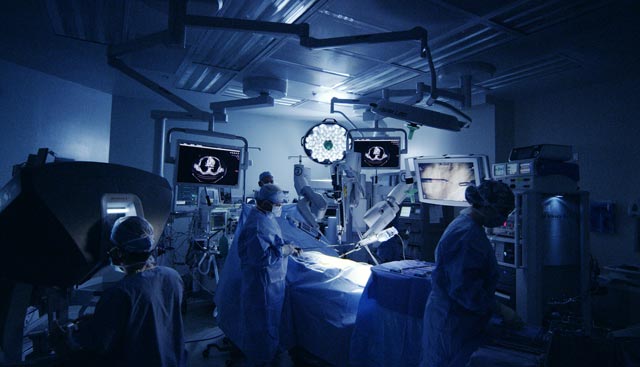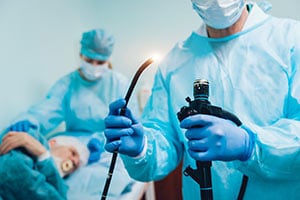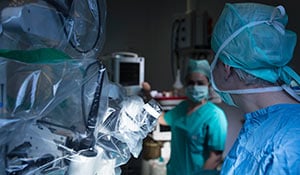Surgery

Esophageal cancer surgery is a common type of treatment in which a surgeon removes part or all of the esophagus, along with some of the surrounding healthy tissue, nearby lymph nodes and, in some cases, the upper part of the stomach.
Surgery can eliminate most (or all) of the cancerous cells from the body, although radiation therapy or chemotherapy may be recommended after the operation to ensure that any remaining cells are destroyed. Sometimes, radiation therapy or chemotherapy are recommended prior to surgery in an attempt to shrink the tumor and make surgery easier.
Who needs surgery?
There is no one-size-fits-all treatment approach for cancer. At Moffitt, our esophageal cancer surgeons are part of a larger, multispecialty team that collaborates to determine the best treatment options and develop an individualized treatment plan for each patient.
When evaluating a patient for esophageal cancer surgery, a surgical team will consider factors such as:
- The size and stage of the cancer
- The histological type of the cancer (the way the cells look under a microscope)
- The specific location of the tumor
- The patient’s age and overall health
In treating esophageal cancer, surgery is most often recommended when the cancer is at an earlier stage and has not spread to other parts of the body. Because it is more common for esophageal cancer to be diagnosed after it has reached advanced stages, surgery is not typically the primary treatment method.
In some instances, surgery might be used not with an intention to completely eradicate the cancer, but rather to prevent or relieve symptoms it may cause and improve a patient’s quality of life. An example of this would be endoscopic surgery to place a stent that helps keep the esophagus open for patients who are having trouble swallowing.
Endoscopic mucosal resection
Early-stage cancers that are limited to the superficial lining of the esophagus may be eligible for endoscopic mucosal resection. During this procedure, the surgeon uses an endoscope (a long, flexible tube with a light and camera at the end) to pass small instruments through to remove the cancerous tissue. This approach allows the surgeon to simply shave off the affected tissue, rather than removing a larger portion of the esophagus.
Esophagectomy

Most surgery for esophageal cancer involves removing a tumor through a standard esophagectomy. During this procedure, the affected portion of the esophagus, some surrounding tissue and lymph nodes (if necessary) are removed. The remaining part of the esophagus is then reconnected to the stomach so that food can still pass through.
More extensive cancers may require an esophagogastrectomy. The difference between the standard esophagectomy and an esophagogastrectomy is that this procedure involves the removal of the top portion of the stomach. If the remaining part of the esophagus can’t be connected to the remaining portion of the stomach, it may be connected to the small or large intestine instead.
Minimally invasive surgery and robotic surgery

Moffitt’s esophageal cancer treatment team comprises world-class surgeons who are highly experienced in minimally invasive surgery, including robotic surgery using the da Vinci® Surgical System. As opposed to traditional open surgery, robotic surgery involves only a few small incisions. The surgeon views the surgical site in the patient’s body on a 3D visualization system and controls tiny instruments using wristed movements. This system allows the surgical instruments to bend and rotate farther than the human hand could alone. This form of esophageal cancer surgery typically results in shorter hospital stays and recovery times, as well as less scarring and pain.
Why choose Moffitt?
Moffitt Cancer Center offers some of the most advanced technologies and surgical techniques available for the treatment of esophageal cancer, such as minimally invasive and robotic-assisted surgery. We are not only a leader in surgical innovation but also a high-volume cancer center. Because of this, our team has unrivaled experience, performing countless esophageal cancer surgeries in any given year. Our surgeons have an unparalleled level of expertise, allowing them to produce exceptional outcomes and extremely high levels of patient satisfaction. Additionally, patients won’t just benefit from one physician’s knowledge here – at Moffitt, a team of skilled surgeons, pathologists, medical oncologists and other medical professionals all work together to tailor a patient’s individualized treatment plan. Furthermore, Moffitt has been named High Performing in terms of gastroenterology surgery according to the U.S. News & World Report’s Best Hospitals for Cancer rankings.
Referrals are not required to seek treatment at Moffitt. To learn more about your options for esophageal cancer surgery, call 1-888-663-3488 or complete a new patient registration form online.
Helpful links:
